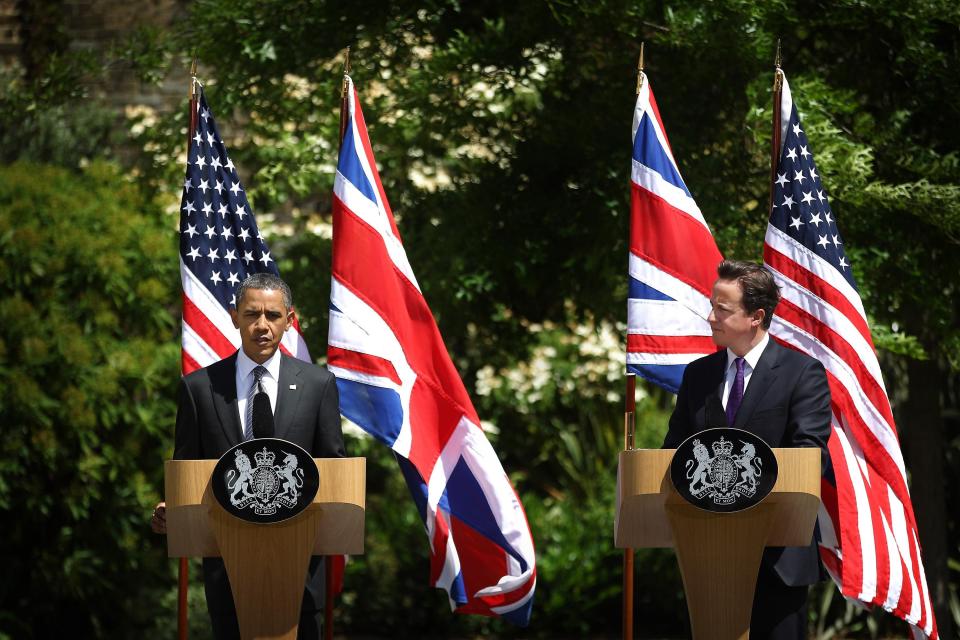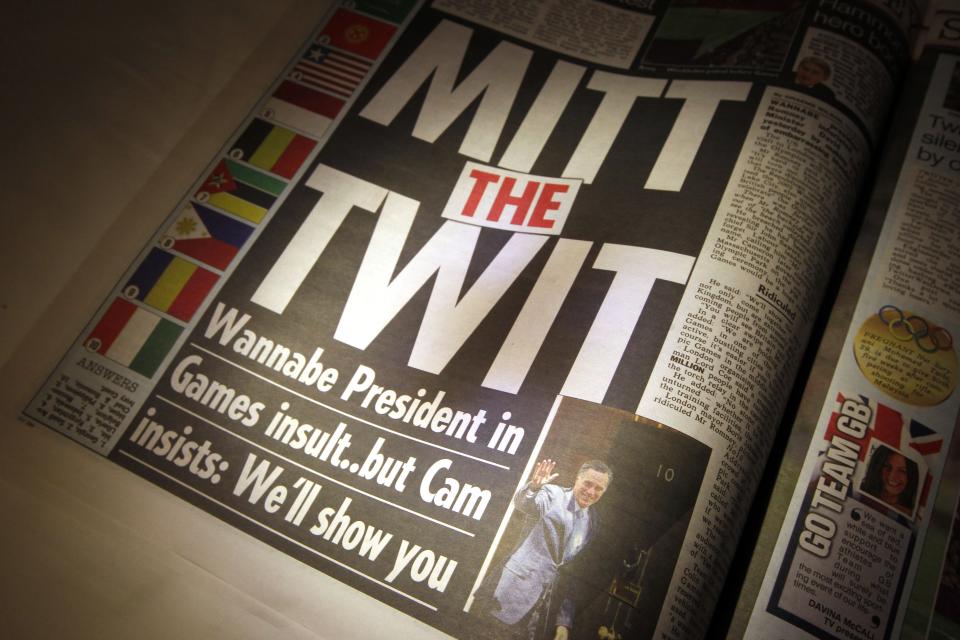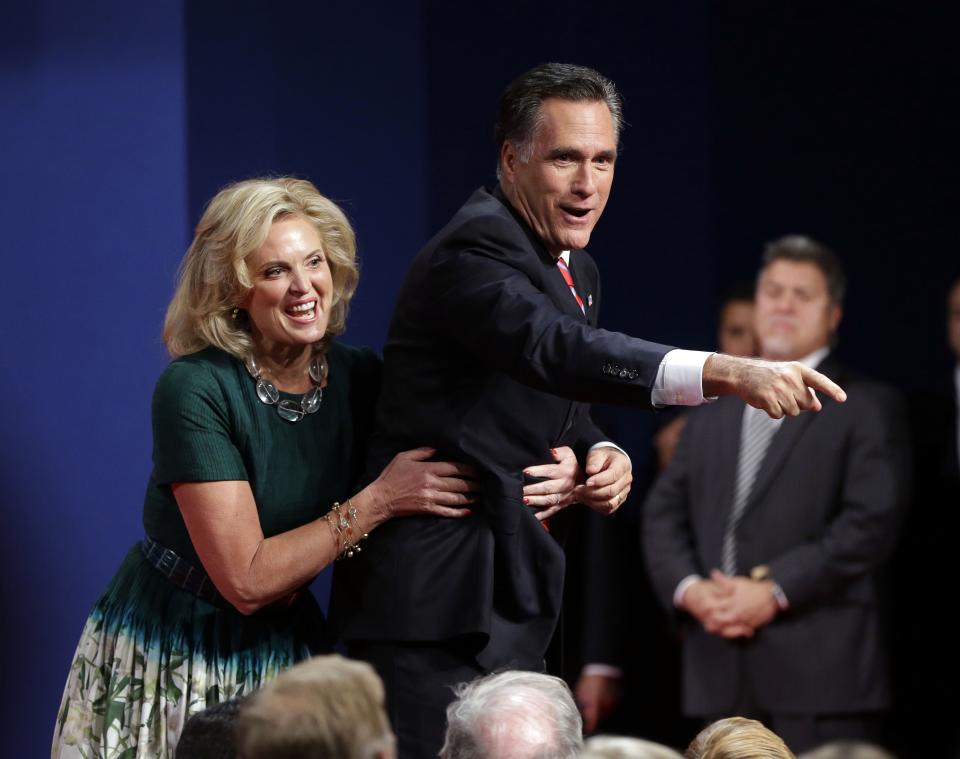Barack Obama v Mitt Romney: Who would Britain vote for?
All the signs are the presidential election is set to be a close-run thing. So just why is Barack Obama overwhelmingly more popular than Mitt Romney in Britain and the rest of Europe? Chris Parsons from Yahoo! UK News takes a look.
While the outcome of the presidential election will ultimately be decided by the American public, both Obama and Romney will be keeping one eye on the world view in the lead-up to November 6.
Barack Obama and Mitt Romney's election campaigning may have been curtailed by Superstorm Sandy this week, but the two candidates are still fully aware they're involved in one of the closest presidential races in recent history.
The vote between the incumbent president and the Republican candidate remains on a knife edge with six days until the polls open, despite the bluster from both sides deriding their opponent's respective campaigns.
Before Superstorm Sandy hit, the two men had spent days travelling around the U.S. in a last-ditch attempt to win votes in key battleground states.
And while the outcome of the presidential election will ultimately be decided by the American public, both Obama and Romney will be keeping one eye on the world view in the lead-up to November 6.
Among the key leadership issues - the economy, healthcare and defence - foreign policy remains important to any presidential campaign.
And the success of a president's foreign policy depends in many ways on how it is perceived outside of the U.S.
So how are the two candidates viewed outside of north America - in particular, how is their battle being seen in the UK and continental Europe?

Having swept to power in a blaze of positivity and enthusiasm in 2008, Obama appears to have maintained his support in the UK, if polls from Britain are anything to go by.
A recent online public opinion survey by polling experts Angus Reid claimed Britons favour the current president over Romney by an overwhelming ratio of 10:1.
The same study showed that just over half (52%) of Britons believed Obama had met their expectations of what he would achieve in his first term, while fewer than one in five (18%) said the President had failed to impress.
Obama's popularity in the UK seems to reflect a general trend across the continent; an AFP report recently revealed the President's European approval rating stood at a healthy 71%.
Conversely, Romney has struggled for widespread popularity in Britain ever since his visit to the UK in July.
Dubbed the 'European Disaster Tour', Romney publicly questioned London's readiness to hold the Olympic Games.
His comments hugely affected his standing among the British public and undermined his attempts to appear presidential.
Related: Get the latest news on the US elections
The Mormon Republican leader was something of an unknown quantity in the UK at the time, but in questioning Britain's capability to host what turned out to be an extremely successful Olympics, Romney lost the respect of the British - to the point where he was deemed by some as less popular than Sarah Palin.
Dr Robert Watt, a lecturer from the Department of Political Science and International Studies at Birmingham University in the UK, told us Romney "alienated himself from pretty much everybody" on the tour.
Other academics though insist Romney has regained ground through his assured performances in the presidential debates - but he still trails Obama considerably in the UK approval stakes.
Dr Watt added many Britons liken Romney's ideology to the religious fundementalism and militarisation which characterised George W Bush's presidency; a comparison which will never play well in the UK.

Dr Watt said: "The view of America as arrogant and overbearing was partly banished by Obama and to a lesser extent Bill Clinton, but Romney will be categorised as just that by a significant number of British people.
"Romney's inept handling of his 'allies' during [July’s] foreign policy tour makes me worry. I can't see him ever having a large fanbase in the UK.
"If something like 9/11 happened again or Afghanistan blew up again, I suspect he would have a knee-jerk, ill-advised response, and I think a lot of British people think that way.
Related: Obama visits Superstorm Sandy emergency HQ
"Blair and Bush didn't come out well from the war on terror and the search for WMDs, and Romney is associated with Bush, rightly or wrongly."
Dr Jonathan Bell, a professor of history at the University of Reading, said that although Romney regained some ground in the debates, he is still struggling to win over the UK.
He told the International Business Times: "He was disliked at the time [of the summer tour], universally, but after the first debate with Obama that tended to fade from view.
"But I wouldn’t say he is seen as a colorful or likeable character. His interaction with a gay veteran in New Hampshire was noticed, for instance.”
Although critics will cite the stalemate in the Israeli-Palestine conflict and the failure to close Guantanamo Bay as negatives of Obama's presidency, polls show the incumbent Democrat President has managed to maintain popularity in Europe despite overseeing the worst economic downturn of a generation in America.
The tracking down and killing of Osama Bin Laden also helped boost his popularity, both at home and abroad.

Failings aside, it remains a fact that Obama is hold more similarities to the dominant political caste that holds sway in both France and Germany at present - "the closest thing [in the United States] to a Social-Democrat", according to Jan Techau, head of the Carnegie Europe think-tank.
Ironically, for all the discussion and attention paid to the US election in Europe, there seems much less interest the other way, with foreign policy a very secondary issue in the November 6 vote for Americans.
Europe, when raised between the rivals, is more often than not mentioned to score political points - Romney dubbing Obama as the man to lead the United States down the same path as twice bailed-out Greece, for example.
Other analysts suggested that the United States cannot simply disregard events in Europe because of economic reasons - the debt crisis has hit the US economy and fixing the problem has to be one of its major concerns.

 Yahoo News
Yahoo News 